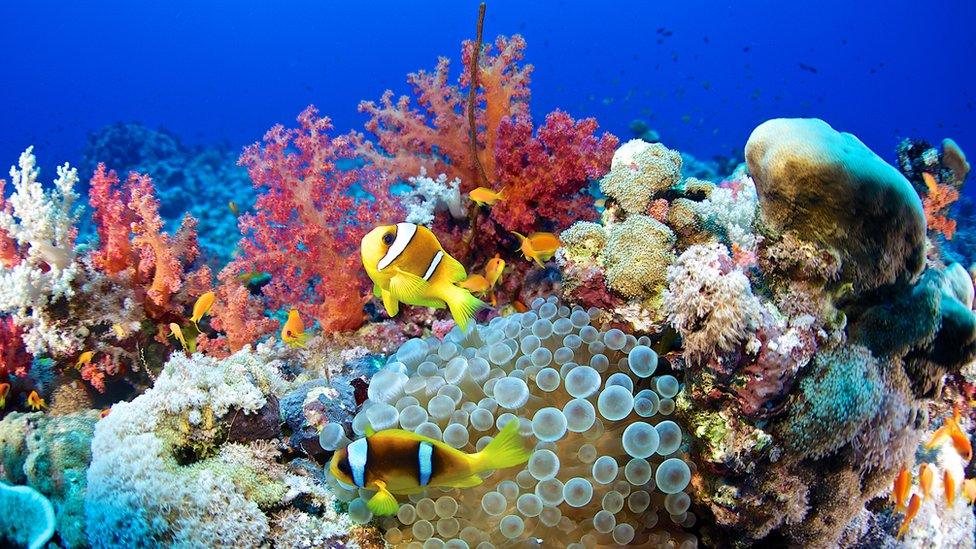Climate change threatens half of planet's coral reefs
- Published
- comments

Coral reefs are home to lots of other marine life
Half of the planet's coral reefs will be in environmental conditions that are unsuitable by 2035 because of climate change.
The findings come from a study by researchers at the University of Hawai'i at M膩noa which suggests the underwater ecosystems face permanent damage.
The researchers say unsuitable conditions are likely to lead to the corals dying and other marine life could also be negatively impacted because of disruptions to the food chain.
Many animals use the reefs as a home as it offers them food, as well as protection from predators.
For the study, the researchers at the university looked at five key factors that can put stress on coral reefs. This included sea surface temperature, ocean acidification, tropical storms, land use and human population.
They found that by 2035, half of the world's coral reefs will be damaged when taking into consideration several of these factors. For example, one region may be experiencing higher sea surface temperature, while another region may be experiencing ocean acidification.
If only a single factor is considered, such as the sea surface temperature, fewer areas seem to be impacted as quickly, and this pushes the date back to 2050.
Coral reefs are at risk of permanent damage because of climate change
The study also predicted that by 2055, almost all of the world's coral reefs (99%) would be facing unsuitable conditions based on at least one of the five factors studied and that by 2100, 93% of coral reefs globally will be under threat by two or more stressors.
"While the negative impacts of climate change on coral reefs are well known, this research shows that they are actually worse than anticipated due to a broad combination of climate change-induced stressors," said lead author Renee O Setter who is a doctoral student at University of Hawai'i at M膩noa.
"It was surprising to find that so many global coral reefs would be overwhelmed by unsuitable environmental conditions so soon due to multiple stressors."
Climate change: What is coral bleaching?
The researchers say the study is the first of its kind and shows how the remaining coral reefs may have a shorter timeline than previously predicted as they are at risk of being affected by at least one of many different factors that are likely to put their environments at risk.
"We know that corals are vulnerable to increasing sea surface temperatures and marine heat waves due to climate change. But it is important to include the complete anthropogenic (environmental change caused or influenced by human activity) impact from numerous stressors that coral reefs are exposed to in order to get a better sense of the overall risks to these ecosystems," said the study's co-author Erik Franklin.
The research team which worked on the study are now preparing to enter the next phase, where they'll be taking a closer look at how climate change is expected to impact individual coral species. They hope this give them a better idea of which species may face greater risks in the future.
- Published7 December 2020
- Published23 September 2016
- Published9 April 2020
